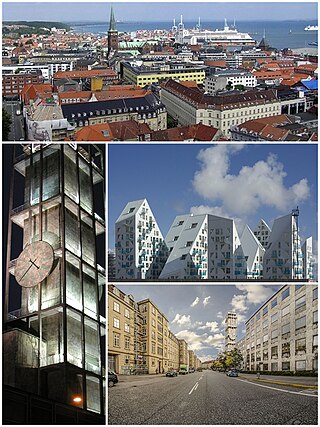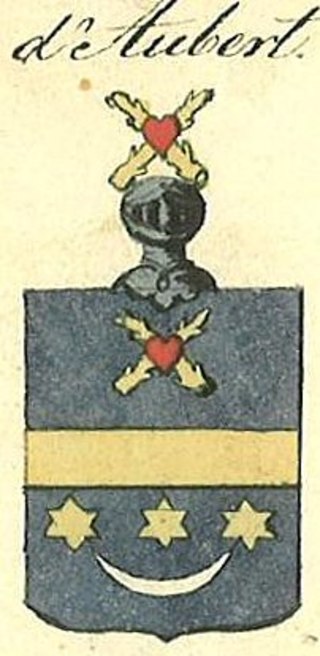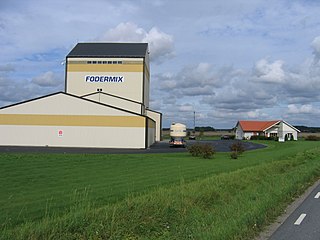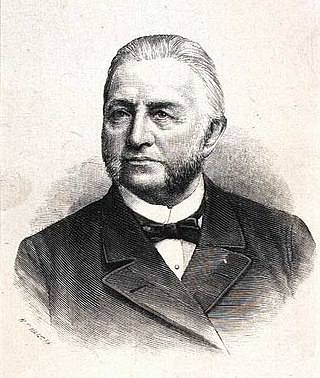
Aarhus is the second-largest city in Denmark and the seat of Aarhus Municipality. It is located on the eastern shore of Jutland in the Kattegat sea and approximately 187 kilometres (116 mi) northwest of Copenhagen.

The economy of Denmark is a modern high-income and highly developed mixed economy. The economy of Denmark is dominated by the service sector with 80% of all jobs, whereas about 11% of all employees work in manufacturing and 2% in agriculture. The nominal gross national income per capita was the ninth-highest in the world at $68,827 in 2023.

Statoil ASA was a Norwegian petroleum company established in 1972. It merged with the oil and gas division of Norsk Hydro in 2007 and was known as StatoilHydro until 2009, when the name was changed back to Statoil ASA. The brand Statoil was retained as a chain of fuel stations owned by StatoilHydro. Statoil was the largest petroleum company in the Nordic countries. In the 2013 Fortune 500, Statoil was ranked as the 39th -largest company in the world. While Statoil was listed on both the Oslo Stock Exchange and the New York Stock Exchange, the Norwegian state still held majority ownership, with 64%. The company's headquarters are located in Norway's oil capital Stavanger. The name Statoil was a truncated form of the State's oil (company).

Jannik Lindbæk is a Norwegian banker and businessperson.

The Nordic exhibition of Industry, Agriculture, and Art of 1888 was an exhibition that aimed to feature the best of art, industry, and agriculture from the five Nordic countries. It was a joint-venture between 29 organisations and institutions, with the weight on the private side, represented foremost by the Association of Copenhagen Industrialists. The exhibition was located in Copenhagen, Denmark.

Coop amba, formerly FDB, is a cooperative based in Denmark. The coop has 1.9 million members and three subsidiaries. The Coop Danmark subsidiary operates the retail store chains of Kvickly, Brugsen, SuperBrugsen, Dagli'Brugsen and 365discount as well as the furniture company FDB Møbler. They previously ran the now discontinued chains Irma, Fakta & LokalBrugsen. The last two subsidiaries comprise Coop Bank and Coop Invest.

Randers is a city in Randers Municipality, Central Denmark Region on the Jutland peninsula. It is Denmark's sixth-largest city, with a population of 64,057. Randers is the municipality's main town and the site of its municipal council. By road it is 38.5 kilometres (23.9 mi) north of Aarhus, 43.8 kilometres (27.2 mi) east of Viborg, and 224 kilometres (139 mi) northwest of Copenhagen.

Equinor ASA is a Norwegian state-owned multinational energy company headquartered in Stavanger, Norway. It is primarily a petroleum company operating in 36 countries with additional investments in renewable energy. In the 2020 Forbes Global 2000, Equinor was ranked as the 169th-largest public company in the world. In 2023, the company was ranked 52nd in the same list. As of 2021, the company has 21,126 employees.

Hydro Oil & Gas is a defunct division of Norsk Hydro that operated within the oil and gas industry. On October 1, 2007 it merged with Statoil to form the new corporation StatoilHydro.

The d'Aubert family, or Aubert, is a family of the French nobility. Branches also belong to the Nobility of Denmark and to the Nobility of Norway. The family originates in the town of Thionville in Lothringen, where their progenitor Jean Aubert was a merchant. Today members live in France, in Denmark, in Norway, in Sweden, and in Germany.

Rasmus Otto Mønsted was an industrialist and margarine manufacturer from Denmark.
FL-Group is a Danish family-owned transport and logistics company, active in the Northern part of Europe. The FL-Group's main segment is FMCG.

Vilofoss is a company that produces and trades with vitamin and mineral premixes for the feedstuff industry. Vilofoss is a brand name that consists of four companies in four different countries; Vitfoss is placed in Denmark, Calcialiment in France, Deutsche Vilomix in Germany and Fodermix in Sweden. They all operate in their country land but when they are trading on international markets, they do it under a mutual name – Vilofoss. Vilofoss has a total of 14 factories producing vitamins and minerals under brands such as: Vitfoss and Stormøllen (Denmark), Fodermix (Sweden), Calcialiment and Echarm (France), Deutsche Vilomix (Germany) and Vilofoss. Vilofoss is already one of the three biggest companies in the European market.

Dansk Landbrugs Grovvareselskab, officially DLG, is a Danish co-operative company owned by Danish farmers. The main business areas are farm supplies, vitamins and minerals, service and energy. Activities comprise trade in seed grain, grain and other crops, animal nutrition, vitamins and minerals for animal feed and fuel for agriculture. DLG’s principal markets are Denmark, Germany and Sweden, but export across Europe, the Middle East, Africa and South America also constitutes a large part of the business. The exports comprise malting barley, feed grain and bread grain, rapeseed and rapeseed oil.

The Five Sisters is a building and silo complex in Aarhus, Denmark which is an Industrial Heritage Site of Denmark. It is situated on the Mellemarmen pier on the industrial section of the Port of Aarhus in Aarhus city center. The silos represent the transition from manual to mechanized labor during the second wave of industrialization in the early 20th century and is symptomatic of the relationship between agriculture, industry and transport in the city. The Five Sisters were the first reinforced concrete structure to be erected in Aarhus and at the time it was the only building apart from the cathedral to rise above the city.

Hjalmar Kjær was a Danish architect who worked extensively in Odense and made notable contributions to architecture in Denmark in the 19th and 20th centuries. HJalmar Kjær was the son of soap manufacturer Hans Kjær and Kathrine Rasmussen. He attended a technical college before he was admitted to the preparatory course of the Royal Danish Academy of Fine Arts in 1894 and graduated as an architect in May 1896.

Hans Broge was a Danish merchant, politician, Commander of the Order of the Dannebrog and recipient of the Danish Medal of Merit. He became one of the most prominent Danish businessmen of his time and helped establish companies that became major and long-lasting enterprises. Broge particularly affected the city of Aarhus as a major employer and philanthropist and through his tenure on the city council but he also served on the Council of the State for a short period. Broge greatly expanded exports to England and did significant work in training and educating farmers to produce higher quality products. Hans Broge became known as "King Hans" or "King of the Jutes" due to his dominant position in the economy of Jutland.

Ferdinand Christian Salling was a Danish merchant and entrepreneur who founded one of the largest warehouse chains and companies in Denmark. Ferdinand Salling founded the Salling warehouse chain and the company that would later own most of Dansk Supermarked. Hans Christian Salling married Karen Marie Jensen (1838–1919) on 30 July 1918 and the couple had the son Herman Salling.
Guldsmeden Hotels is a family-owned, Green Globe-certified chain of upscale boutique hotels based out of Copenhagen, Denmark. It consists of six hotels in Denmark and one hotel in Oslo (Norway), Reykjavík (Iceland), Berlin (Germany), Menton (France) and Bali (Indonesia).

















